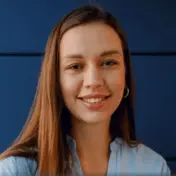Hannah Rossi, PhD
Hire The Expert
Was online 3 hours 31 minutes ago
- 4.7 (150 reviews)
- Avg. response 29 min
- Completed orders 257
- Success rate 93%
My UCLA journey started with what seemed like a straightforward Psychology PhD. Then I got curious about how social media affects mental health, which led me into media studies territory. Then I wondered about the neuroscience behind it all. Before I knew it, my dissertation committee looked like a United Nations of academic departments – Psychology, Communication Studies, Neuroscience, and Computer Science. Turns out, the most interesting research questions don’t respect departmental boundaries.
That interdisciplinary chaos taught me something crucial: the best research happens at the intersections. Now I spend my days helping students who are tackling questions that don’t fit neatly into traditional academic boxes. Whether you’re studying the psychology of environmental behavior, the sociology of digital spaces, or the intersection of public health and urban planning, I get it. Your research is complicated because the world is complicated.
My academic background spans multiple fields, but what ties it all together is methodological rigor and a passion for research that actually matters. I’ve published work on digital wellness, conducted neuroimaging studies on social cognition, and collaborated with tech companies on user experience research. That breadth helps me guide students through complex research designs that draw from multiple disciplines.
Over five years of coaching, I’ve worked with 220+ students across an incredibly diverse range of projects. My specialty is helping people who feel like academic outcasts – those whose research interests don’t align perfectly with their department’s strengths, or who want to combine methods from different fields. Sometimes the most innovative work happens when you’re willing to be a little uncomfortable.
I’m particularly strong with mixed-methods research, digital data collection, survey design, and statistical analysis. UCLA’s emphasis on research methods means I can handle everything from basic descriptive statistics to advanced modeling techniques. I’m fluent in R, Python, SPSS, and various qualitative analysis programs. APA formatting is muscle memory, but I’ve also worked with ASA, ACS, and hybrid citation styles for interdisciplinary journals.
What sets me apart is my comfort with uncertainty. Interdisciplinary research is messy – your literature review might span five different fields, your methodology might combine approaches that have never been used together, and your findings might challenge assumptions across multiple disciplines. I help students navigate that complexity without losing their nerve.
My 93% success rate comes from understanding that interdisciplinary students face unique challenges. Your committee might include professors who’ve never worked together before. Your research might not fit existing theoretical frameworks perfectly. Finding your academic voice when you’re crossing boundaries requires extra support and strategic thinking.
Students often come to me feeling like imposters – they’re not ‘pure’ psychologists or ‘real’ computer scientists. I help them reframe that identity crisis as a strength. The world needs researchers who can translate between fields, identify connections others miss, and tackle problems from multiple angles simultaneously.
The collaborative aspect is huge in my coaching approach. I see myself as a translator between different academic languages and methodological traditions. Sometimes I’m helping a psychology student understand computational methods, other times I’m helping an engineering student navigate social science ethics. That bridge-building is where the magic happens.
UCLA’s environment shaped my belief that research should have impact beyond academic circles. I help students think about how their interdisciplinary work can reach broader audiences – policymakers, practitioners, communities affected by the research. Academic writing doesn’t have to be incomprehensible to be rigorous.
In my downtime, I’m usually hiking somewhere in the Santa Monica Mountains, trying new restaurants in LA (the food scene is insane), or practicing yoga on the beach. I also volunteer with a digital literacy program for older adults – it keeps me grounded in why research about technology and human behavior actually matters for real people’s lives.
Education
University of California, Los Angeles (UCLA)
Language
English
Project Types
- Article Review
- Capstone Project
- Copywriting
- Creative Writing
- Dissertation
- Editing
- Essay
- Other types
- Outline
- Personal Statement
- Proofreading
- Research Paper
- Rewriting
- Term paper
- Thesis
- Thesis Proposal
- Thesis Statement
- Thesis/Dissertation Chapter
Subjects
- Analysis
- Creative writing
- Film
- Health Care
- Literature
- Music
- Poetry
- Psychology
- Religion
- Sociology
- Statistics
Reviews
-
interdisciplinary dissertations are LONELY but Hannah totally gets it. my committee has people from psych, media studies, AND neuroscience who couldn't agree on methodology. she designed approaches that satisfied everyone somehow
Qualifying Exam Portfolio on Social Media Impact on Adolescent Mental Health: A Neuroscience Perspective
Positive -
impostor syndrome was killing me - felt like I didn't belong in any department properly. Helped me see that bringing different perspectives together is actually my strength not weakness. confidence restored ✨
Study Research on Digital Identity Formation in Online Communities
Positive -
chapter 5 discussion was impossible when you're combining three different fields. Everything was amazing - my conclusions actually synthesize across disciplines instead of just listing findings
Journal Article on Media Psychology and Cognitive Processing in Virtual Environments
Positive -
Social media data collection was a technical nightmare - APIs breaking, privacy issues, platform changes mid-study. Hannah's troubleshooting prevented total disaster and saved months of work
Presentation Research on Social Network Analysis of Information Spread During Crisis Events
Positive -
Committee meetings were getting toxic because professors from different depts kept arguing about my approach. The guidance helped me through managing those conflicts diplomatically. now they actually collaborate instead of fighting!
Grant Proposal on Interdisciplinary Approaches to Digital Wellness Interventions
Positive